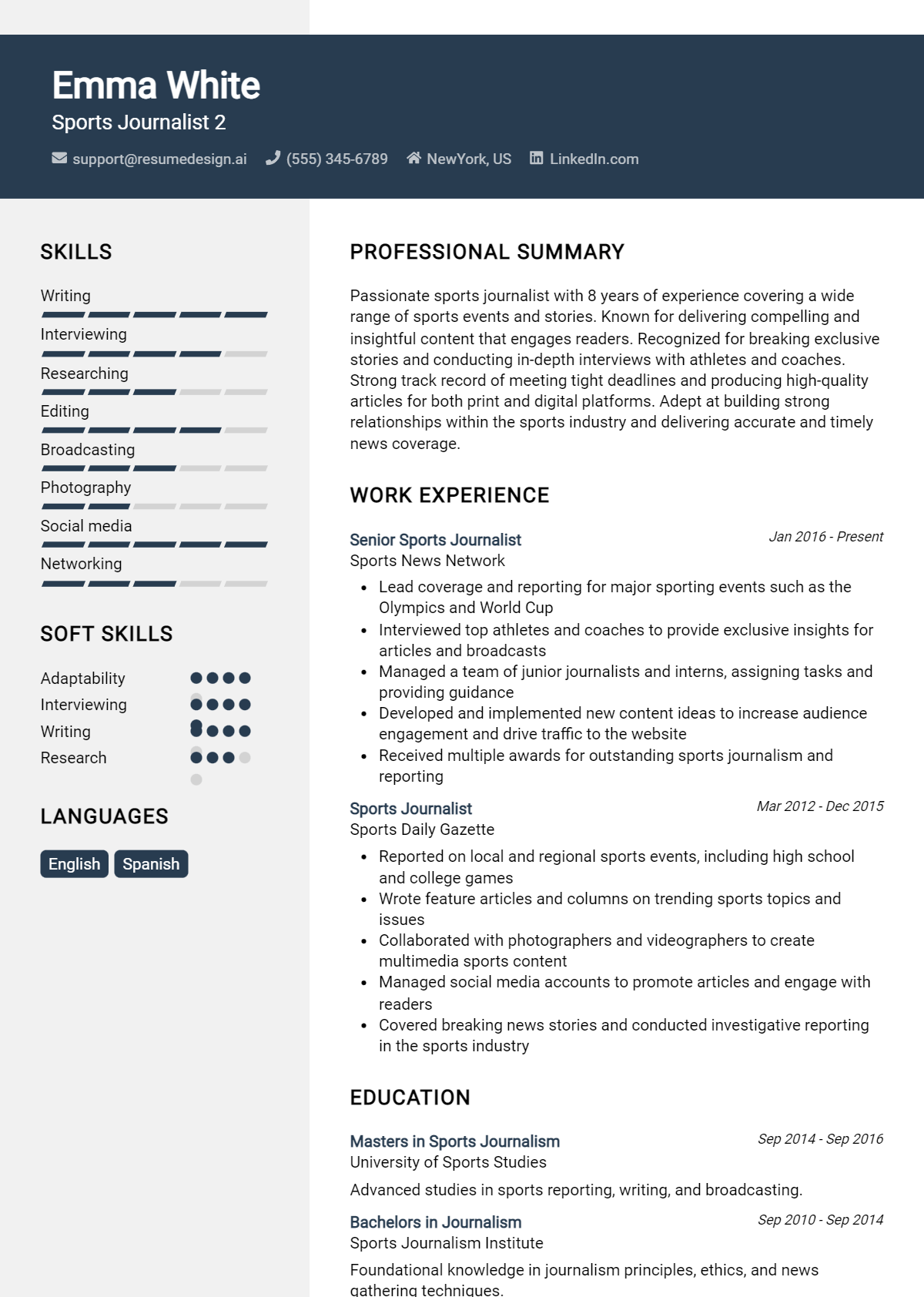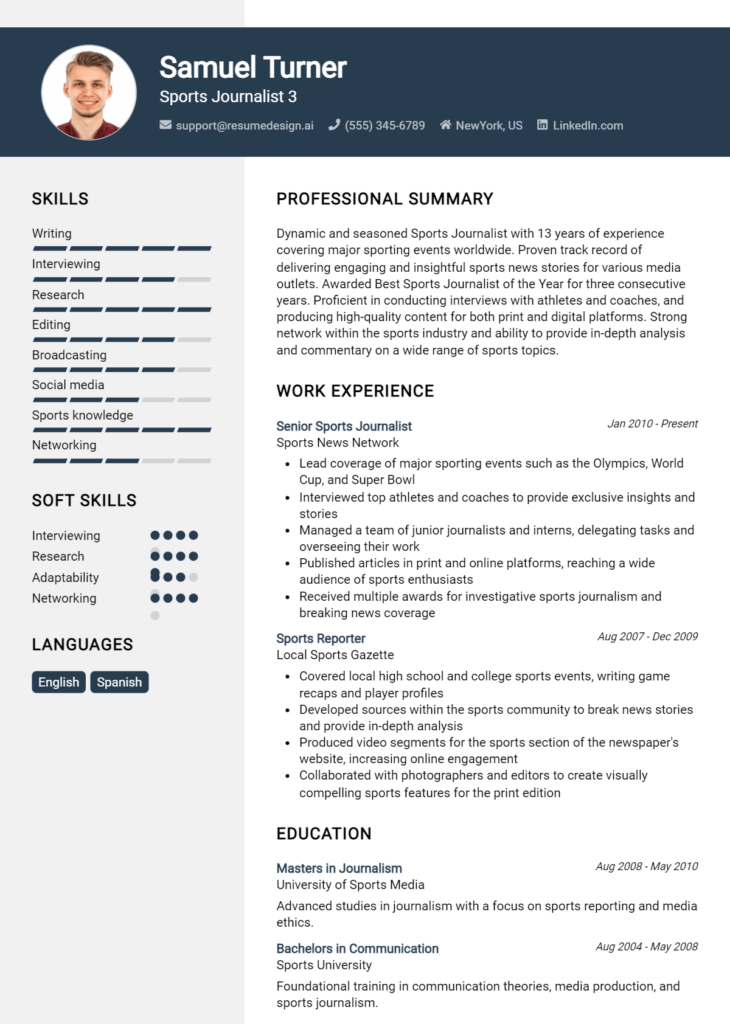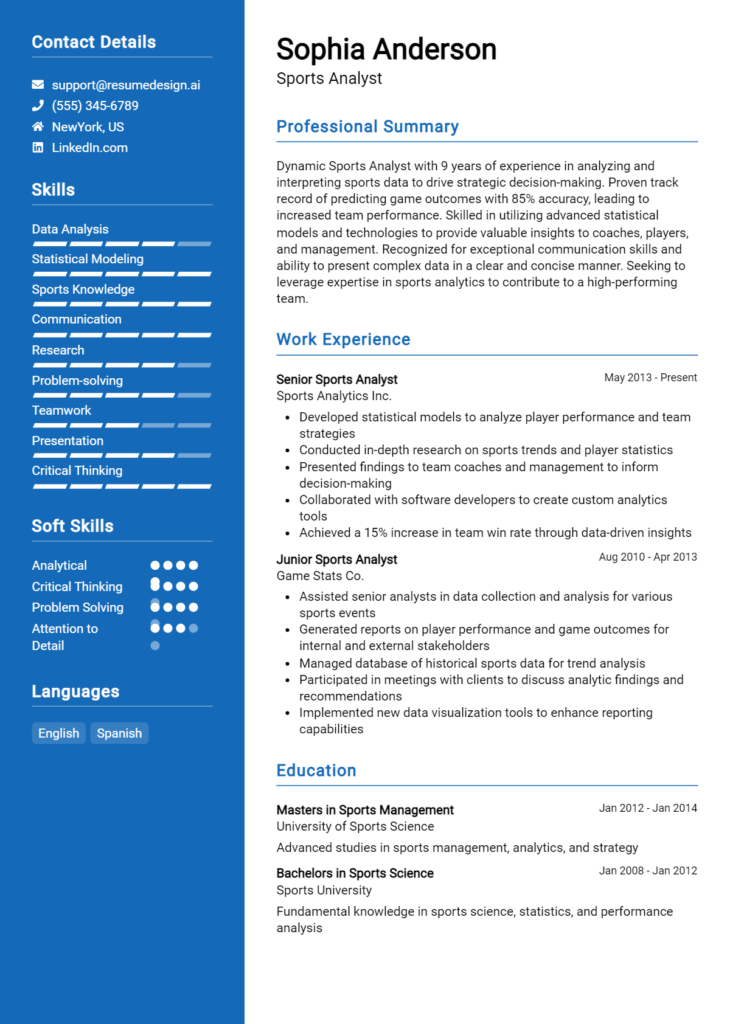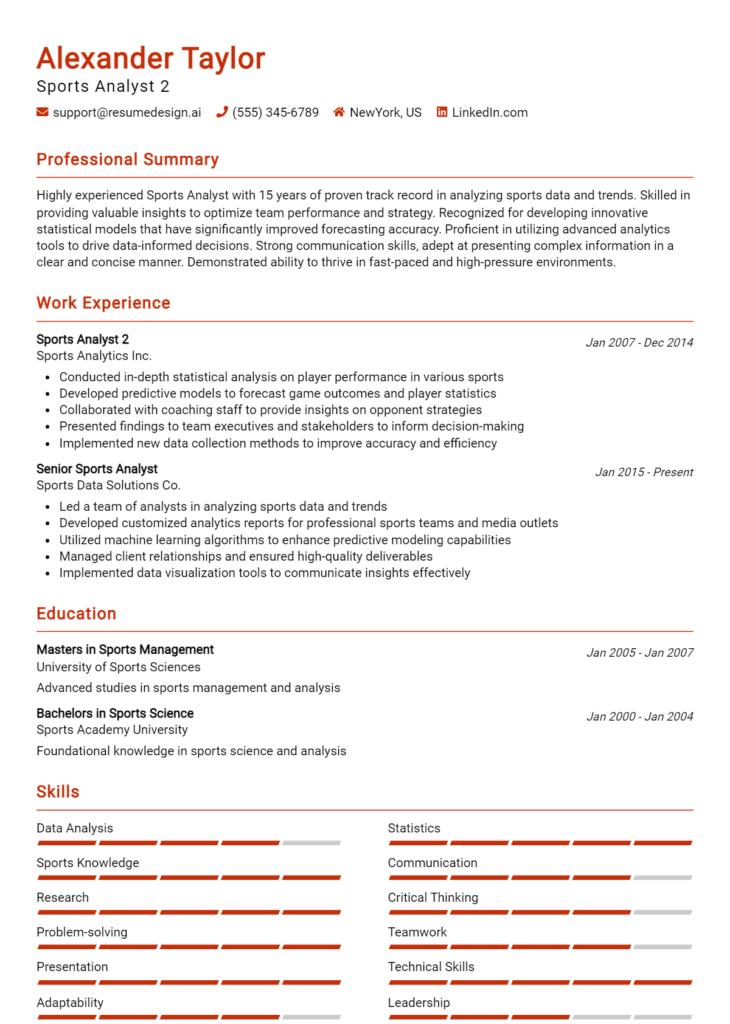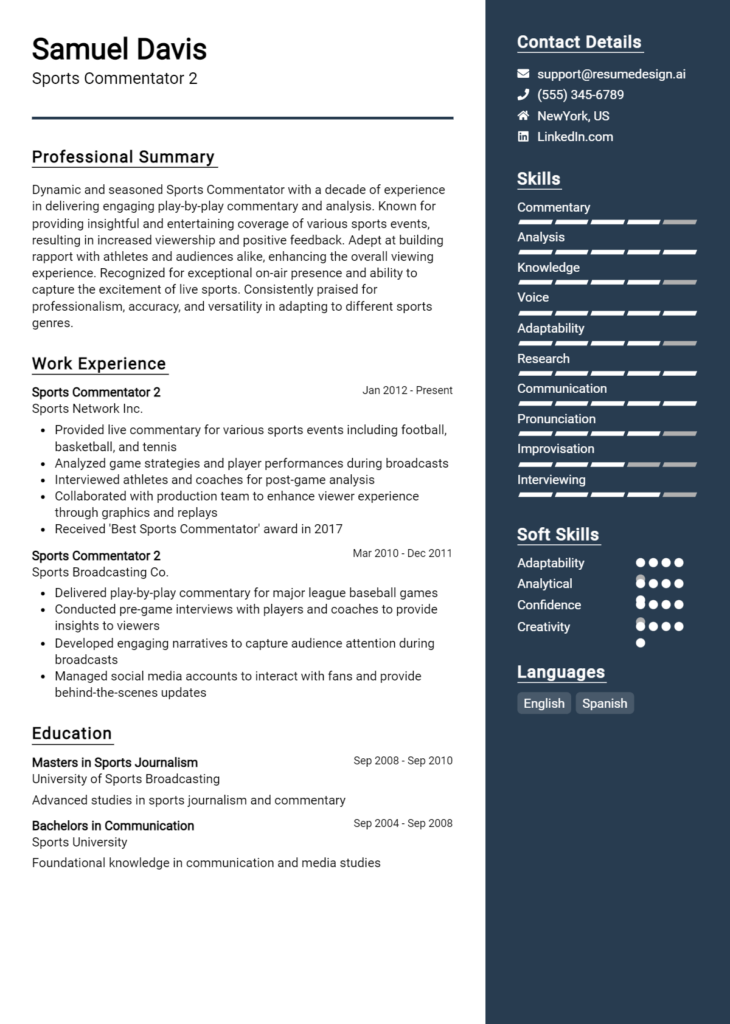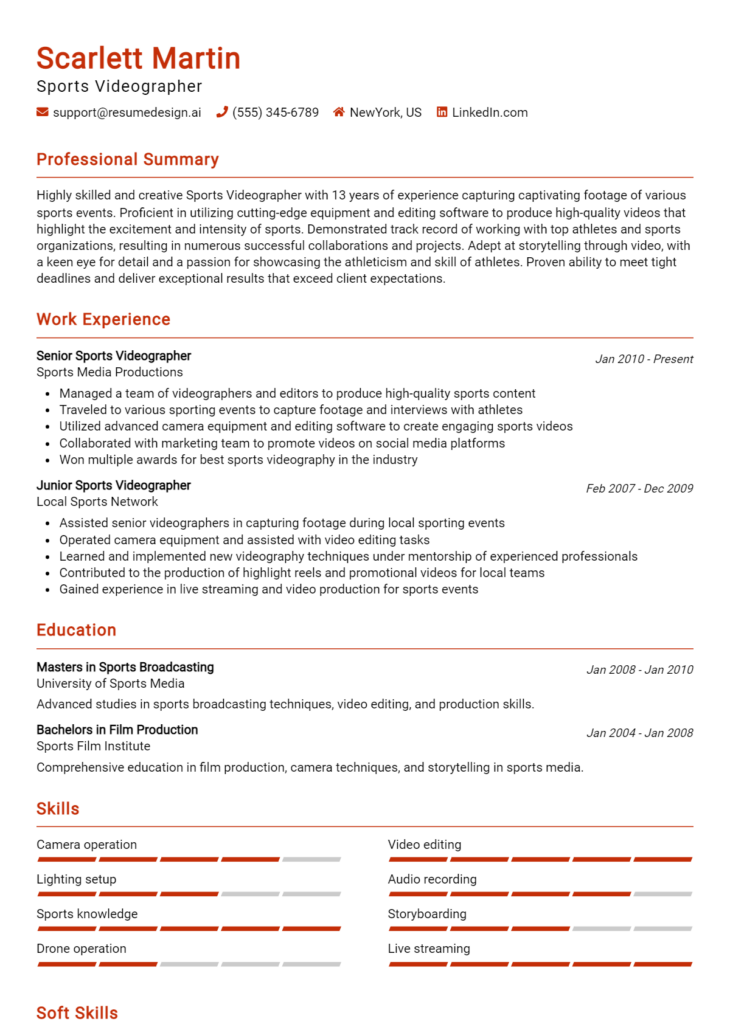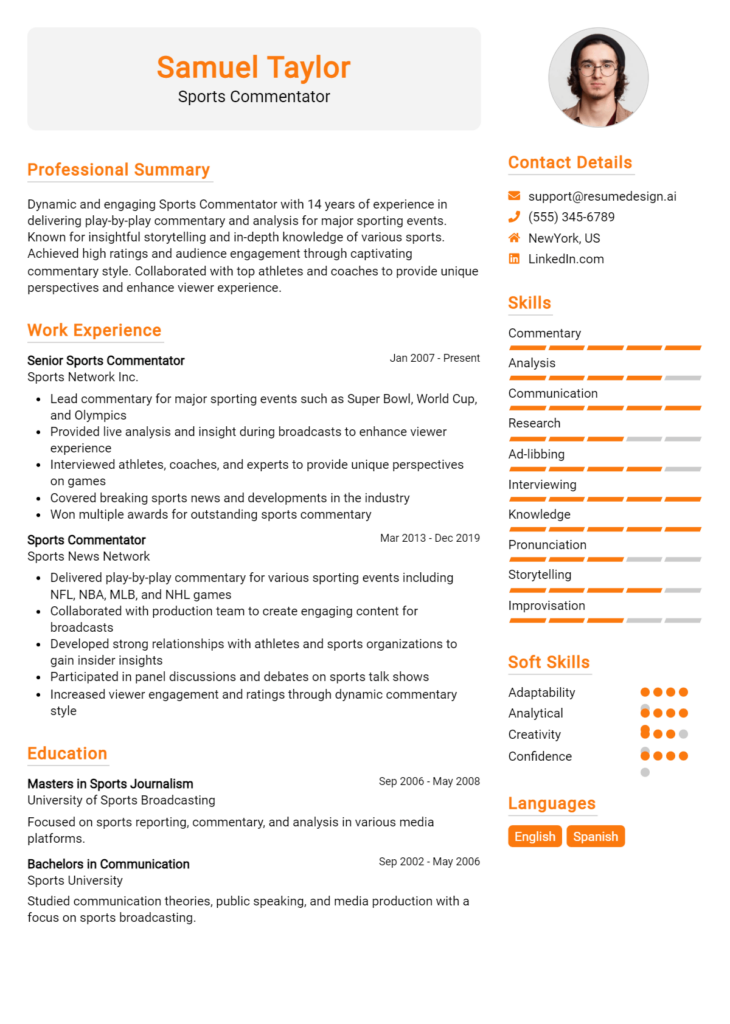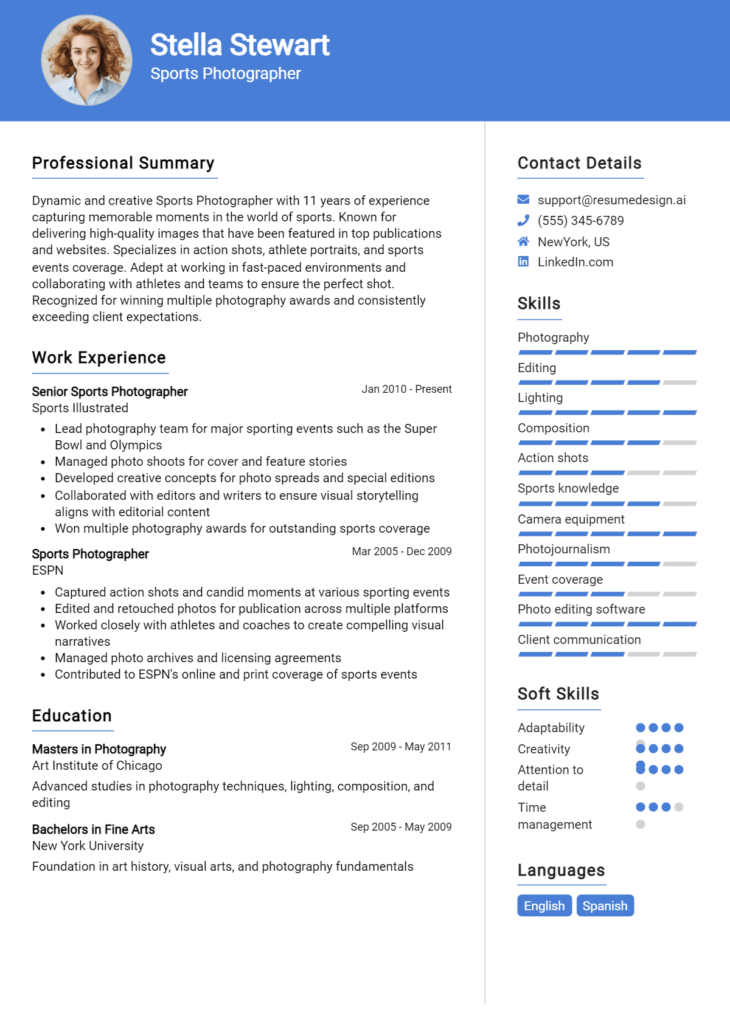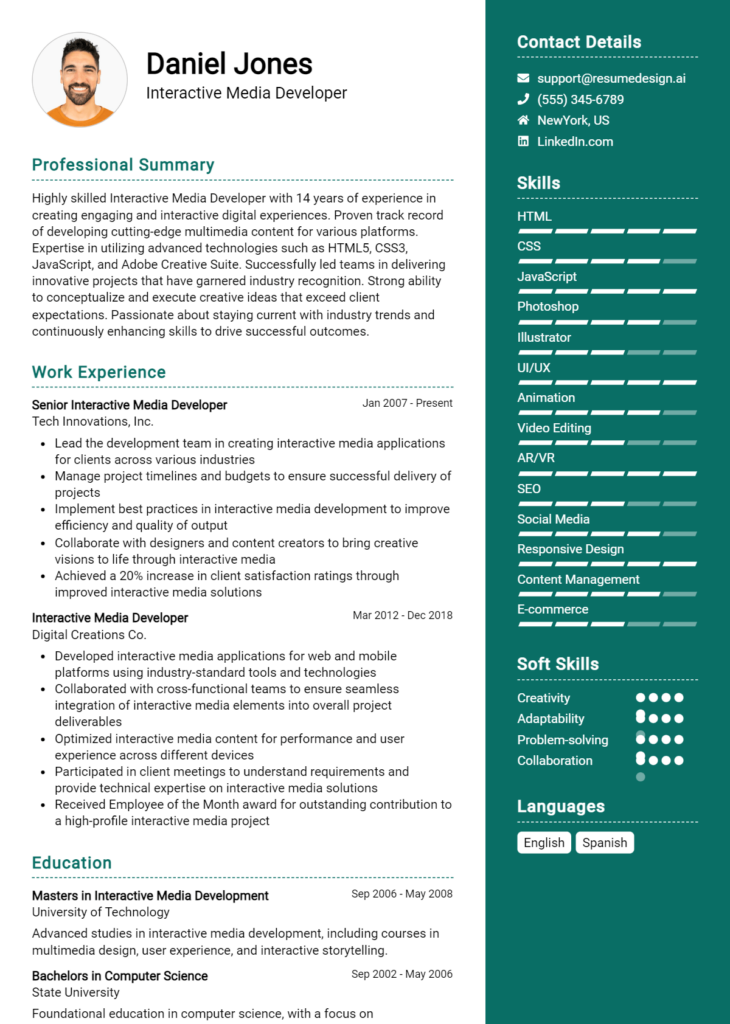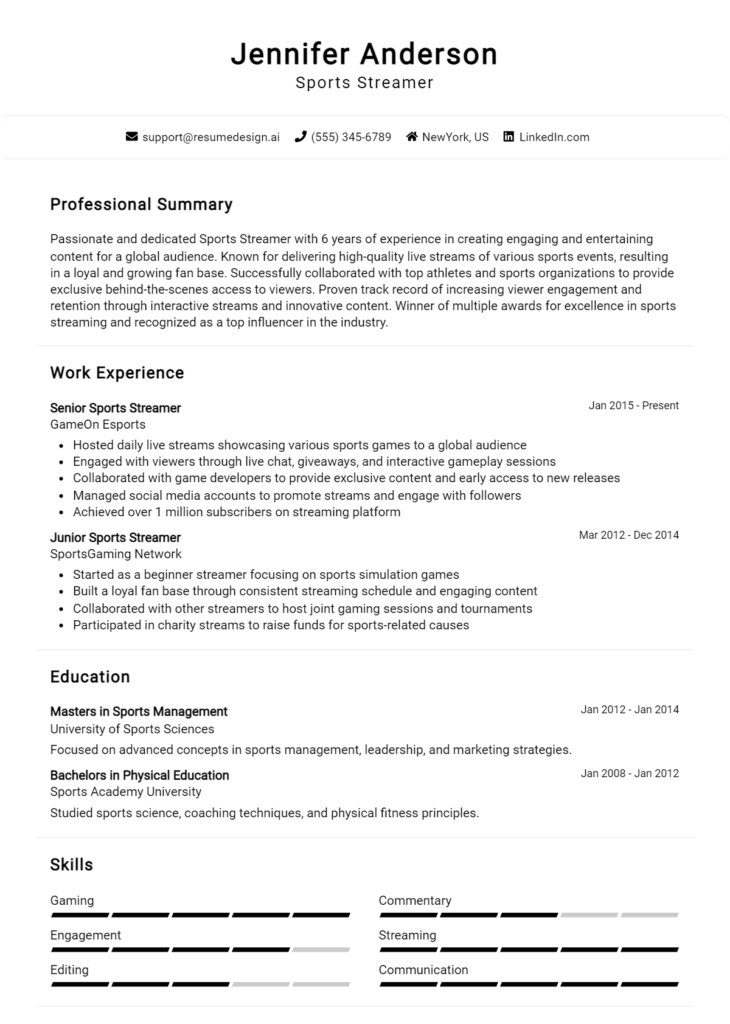Sports Journalist Core Responsibilities
A Sports Journalist plays a crucial role in bridging various departments such as editorial, marketing, and public relations. Key responsibilities include researching sports events, conducting interviews, and writing compelling articles that engage audiences. Essential skills encompass technical proficiency in digital media, operational understanding of news cycles, and strong problem-solving abilities to navigate fast-paced environments. These competencies contribute significantly to the organization's goals by enhancing audience reach and engagement. A well-structured resume effectively highlights these qualifications, showcasing a journalist's expertise and versatility.
Common Responsibilities Listed on Sports Journalist Resume
- Research and report on sports events, teams, and athletes.
- Conduct interviews with players, coaches, and sports figures.
- Create engaging and informative articles for print and digital platforms.
- Cover live sporting events and provide real-time updates.
- Develop story ideas and pitch them to editorial teams.
- Collaborate with photographers and videographers to enhance storytelling.
- Utilize social media to promote content and engage with audiences.
- Stay updated on industry trends and changes in sports regulations.
- Fact-check information to ensure accuracy in reporting.
- Work with marketing teams to develop promotional strategies.
- Establish and maintain relationships with sports organizations and stakeholders.
- Analyze audience metrics to refine content strategies.
High-Level Resume Tips for Sports Journalist Professionals
In the competitive world of sports journalism, a well-crafted resume serves as your most powerful tool in making a memorable first impression on potential employers. As the gateway to your career opportunities, your resume needs to effectively showcase not just your skills but also your achievements in a way that resonates with hiring managers. It’s crucial that your resume reflects your passion for sports, your ability to tell compelling stories, and your understanding of the industry. In this guide, we will provide practical and actionable resume tips specifically tailored for Sports Journalist professionals, helping you stand out in a crowded field and secure that dream job.
Top Resume Tips for Sports Journalist Professionals
- Tailor your resume to align with the specific job description, highlighting relevant experiences that match the requirements.
- Include a strong summary statement that encapsulates your career objectives and showcases your passion for sports journalism.
- Showcase relevant experience by detailing your roles in previous positions, including internships, freelance work, and contributions to publications.
- Quantify your achievements by including metrics such as audience growth, readership engagement, or successful story placements.
- Highlight industry-specific skills, such as knowledge of sports analytics, multimedia storytelling, and digital content creation.
- Incorporate keywords from the job posting to improve your chances of passing through Applicant Tracking Systems (ATS).
- Include links to your published work or an online portfolio to provide tangible proof of your writing ability and style.
- Keep your format clean and professional, using clear headings and bullet points to enhance readability.
- Stay concise; aim for a one-page resume unless you have extensive experience that warrants more space.
By implementing these tips, you can significantly enhance your resume's effectiveness and increase your chances of landing a job in the sports journalism field. A well-structured resume that highlights your unique skills and achievements will not only catch the eye of hiring managers but also position you as a strong candidate in a highly competitive industry.
Why Resume Headlines & Titles are Important for Sports Journalist
In the competitive field of sports journalism, a resume headline or title serves as the first point of contact between a candidate and potential employers. A well-crafted headline can instantly capture the attention of hiring managers by summarizing a candidate's key qualifications in a single, impactful phrase. It should be concise, relevant, and directly related to the specific job being applied for, ensuring that it resonates with the hiring team's expectations and priorities. A strong headline not only sets the tone for the resume but also establishes the candidate's professional identity, making them stand out in a crowded applicant pool.
Best Practices for Crafting Resume Headlines for Sports Journalist
- Keep it concise: Aim for a headline that is no longer than one sentence.
- Be role-specific: Tailor the headline to reflect the specific position you are applying for.
- Highlight key strengths: Focus on your most relevant skills, experiences, or accomplishments.
- Use action words: Incorporate strong verbs to convey confidence and assertiveness.
- Incorporate industry keywords: Use terminology that is commonly recognized in sports journalism.
- Avoid jargon: While industry terms are important, steer clear of overly complex language.
- Showcase uniqueness: Highlight what makes you different from other candidates.
- Revise and refine: Edit your headline to ensure clarity and impact.
Example Resume Headlines for Sports Journalist
Strong Resume Headlines
Dynamic Sports Journalist with 5+ Years of Experience in Investigative Reporting
Award-Winning Sports Writer Specializing in In-Depth Analysis and Feature Stories
Passionate Sports Journalist with Expertise in Digital Media and Social Engagement
Weak Resume Headlines
Journalist
Experienced Writer
The strong headlines are effective because they clearly communicate the candidate's specific qualifications and areas of expertise, making it easy for hiring managers to gauge their suitability for the job. In contrast, the weak headlines fail to impress because they are vague and non-specific, providing little insight into the candidate's skills or achievements. Without a compelling headline, candidates risk blending into the larger pool of applicants, missing the opportunity to make a strong first impression.
Writing an Exceptional Sports Journalist Resume Summary
A well-crafted resume summary is crucial for Sports Journalists, as it serves as the first impression for hiring managers who are inundated with applications. This concise introduction quickly captures attention by highlighting key skills, relevant experience, and notable accomplishments that align with the job role. An impactful summary not only showcases the candidate's strengths but also demonstrates their understanding of the industry and their ability to contribute effectively. Tailoring this summary to the specific job being applied for ensures it resonates with the employer, making it an essential component of a successful resume.
Best Practices for Writing a Sports Journalist Resume Summary
- Quantify Achievements: Use numbers and measurable outcomes to demonstrate your impact, such as audience reach or article engagement.
- Focus on Skills: Highlight relevant skills like investigative reporting, multimedia storytelling, and social media proficiency.
- Use Industry Keywords: Incorporate keywords from the job description to pass through applicant tracking systems.
- Be Concise: Keep your summary brief—ideally, 2-4 sentences that encapsulate your most important attributes.
- Showcase Relevant Experience: Highlight specific experiences that directly relate to the role you are applying for.
- Demonstrate Passion: Convey your enthusiasm for sports journalism and your dedication to covering impactful stories.
- Tailor for Each Application: Customize your summary for each job application to reflect the unique requirements and culture of the organization.
Example Sports Journalist Resume Summaries
Strong Resume Summaries
Dynamic Sports Journalist with over 5 years of experience covering major league events, achieving a 30% increase in readership through engaging multimedia content. Skilled in leveraging social media platforms to enhance story visibility and audience interaction.
Results-driven reporter with a proven track record of producing in-depth analyses and feature articles that have won multiple awards. Successfully increased online traffic by 50% through strategic SEO practices and compelling storytelling.
Versatile journalist with expertise in both print and digital media, having contributed to top-tier outlets like ESPN and Bleacher Report. Experienced in live event coverage, with a knack for capturing the excitement of the moment and delivering real-time updates.
Weak Resume Summaries
I am a journalist with experience in sports. I write articles and sometimes cover events.
Enthusiastic about sports and looking for a job in sports journalism where I can write and report on various topics.
The strong resume summaries stand out because they provide specific examples of achievements, quantify results, and clearly illustrate relevant skills and experience. They are tailored to the role and demonstrate a clear understanding of the sports journalism field. In contrast, the weak summaries are vague, lacking measurable outcomes and specific achievements, making them less impactful and memorable to hiring managers.
Work Experience Section for Sports Journalist Resume
The work experience section of a Sports Journalist resume is vital as it serves as a showcase for the candidate's technical skills, teamwork capabilities, and ability to deliver high-quality content under pressure. This section allows potential employers to see not only what the journalist has done but how they have contributed to their previous organizations. By quantifying achievements and aligning experiences with industry standards, candidates can effectively demonstrate their value and readiness for the role, making a compelling case for their candidacy.
Best Practices for Sports Journalist Work Experience
- Highlight specific technical skills relevant to sports journalism, such as proficiency in digital storytelling, multimedia content creation, and SEO optimization.
- Quantify achievements with metrics, such as audience growth percentages, engagement rates, or successful project completions.
- Emphasize collaboration with teams, showcasing experience in working with editors, photographers, and other journalists to produce cohesive stories.
- Include a variety of experiences, such as freelance work, internships, and full-time positions, to display versatility.
- Focus on results-driven narratives, illustrating how your contributions led to successful projects or initiatives.
- Tailor the content to reflect industry standards, using terminology and frameworks familiar to potential employers.
- Maintain a clear and concise format to ensure readability and easy navigation through experiences.
- Incorporate relevant keywords from job descriptions to enhance visibility during applicant tracking system screenings.
Example Work Experiences for Sports Journalist
Strong Experiences
- Led a team of five journalists to produce a weekly sports podcast, resulting in a 40% increase in listener engagement over six months.
- Authored over 100 articles covering major league events, achieving an average of 30,000 views per article, significantly exceeding company benchmarks.
- Collaborated with the digital marketing team to implement an SEO strategy that improved organic traffic to sports articles by 50% within three months.
- Produced live coverage of the annual state championship, coordinating with a production crew to deliver real-time updates that reached over 100,000 viewers.
Weak Experiences
- Wrote articles about different sports.
- Worked with a team on various projects.
- Attended sports events and took notes.
- Participated in the publication of a sports magazine.
The examples of strong experiences illustrate specific achievements and quantifiable outcomes that highlight the candidate’s impact and technical leadership within their roles. In contrast, the weak experiences lack detail and measurable results, making them less compelling to potential employers. By focusing on clear, impactful narratives in the strong examples, candidates can effectively demonstrate their capabilities and relevance in the field of sports journalism.
Education and Certifications Section for Sports Journalist Resume
The education and certifications section of a Sports Journalist resume plays a pivotal role in showcasing the candidate's academic achievements and commitment to the industry. This segment not only highlights relevant degrees and certifications but also reflects the individual's dedication to continuous learning and professional development. By presenting pertinent coursework, specialized training, and industry-recognized credentials, candidates can significantly enhance their credibility and demonstrate their alignment with the expectations of the job role. A well-crafted education and certifications section can set a candidate apart in a competitive field, showcasing their readiness to tackle the challenges of sports journalism.
Best Practices for Sports Journalist Education and Certifications
- Include relevant degrees, such as a Bachelor's or Master's in Journalism, Communications, or Sports Management.
- List industry-recognized certifications, such as those from the Associated Press or National Sports Media Association.
- Highlight specialized training workshops or courses focused on sports reporting, writing, or broadcasting.
- Be specific about relevant coursework that pertains to sports journalism, such as Sports Ethics or Media Law.
- Keep the section concise and focused on qualifications that directly enhance your candidacy for sports journalism roles.
- Use bullet points to make the information easily scannable for hiring managers.
- Update this section regularly to include any new certifications or courses completed.
Example Education and Certifications for Sports Journalist
Strong Examples
- Bachelor of Arts in Journalism from the University of Sports Media, 2021
- Certified Sports Journalist (CSJ) from the National Sports Media Association, 2022
- Completed coursework in Sports Writing and Reporting at the Academy of Journalism, 2020
- Advanced Certificate in Digital Sports Media from the Online Journalism Institute, 2023
Weak Examples
- Bachelor of Arts in English Literature from the University of Literature, 2017
- Certificate in Creative Writing from a local community college, 2018
- High School Diploma from Springfield High School, 2015
- Outdated certification in General Journalism from a non-accredited institution, 2015
The strong examples are considered effective because they directly relate to sports journalism, showcasing relevant degrees, certifications, and specialized coursework that align with the demands of the role. In contrast, the weak examples reflect qualifications that lack relevance to sports journalism or are outdated and do not enhance the candidate's suitability for the position. Providing strong educational and certification examples is essential in establishing credibility and demonstrating preparedness for a career in sports journalism.
Top Skills & Keywords for Sports Journalist Resume
In the competitive field of sports journalism, possessing the right skills is paramount for standing out among candidates. A well-crafted resume not only showcases your experience but also highlights the specific hard and soft skills that are essential for success in this dynamic industry. These skills enable journalists to effectively report on events, conduct interviews, and engage with audiences across various platforms. By emphasizing your unique skill set, you can demonstrate your value to potential employers and increase your chances of securing that coveted role in sports journalism.
Top Hard & Soft Skills for Sports Journalist
Soft Skills
- Strong communication skills
- Critical thinking
- Adaptability
- Team collaboration
- Time management
- Attention to detail
- Problem-solving
- Networking abilities
- Creative thinking
- Passion for sports
Hard Skills
- Proficient in AP Style writing
- Knowledge of multimedia production
- Social media management
- Data analysis and interpretation
- Video editing software proficiency
- Photography skills
- Research techniques
- SEO optimization
- Broadcasting techniques
- Understanding of sports statistics
By incorporating these skills into your resume, along with a detailed overview of your work experience, you can effectively demonstrate your readiness to tackle the challenges and demands of a sports journalist role.
Stand Out with a Winning Sports Journalist Cover Letter
Dear Hiring Manager,
I am excited to submit my application for the Sports Journalist position at [Company Name], as advertised on [Job Board/Company Website]. With a degree in Journalism and over five years of experience covering various sports, I possess both the skills and passion to deliver compelling narratives that engage and inform your audience. My unique perspective, honed through years of reporting live events and conducting in-depth interviews with athletes and coaches, allows me to bring a fresh take to sports journalism.
During my time at [Previous Company/Publication], I developed a reputation for breaking news stories and providing in-depth analysis that resonated with our readers. My ability to adapt quickly to fast-paced environments, coupled with my strong research skills, enables me to produce high-quality content under tight deadlines. I pride myself on my dedication to accuracy and my commitment to ethical journalism, ensuring that every piece I write maintains the integrity and credibility that your publication is known for.
I am particularly drawn to [Company Name] because of its innovative approach to sports coverage and its commitment to showcasing diverse voices in athletics. I believe that my experience in multimedia storytelling and social media engagement would contribute to the ongoing success of your team. I am eager to collaborate with fellow journalists to create engaging content that not only informs but inspires sports enthusiasts across all platforms.
Thank you for considering my application. I look forward to the opportunity to discuss how my background, skills, and enthusiasms align with the goals of [Company Name]. I am excited about the possibility of contributing to your esteemed publication and sharing the stories that matter in the world of sports.
Sincerely,
[Your Name]
[Your Contact Information]
Common Mistakes to Avoid in a Sports Journalist Resume
When applying for a position as a sports journalist, crafting a standout resume is crucial to making a good impression on potential employers. However, many applicants make common mistakes that can hinder their chances of being noticed. Understanding these pitfalls can help you create a more compelling resume that highlights your skills, experience, and passion for sports journalism. Here are some common mistakes to avoid:
Generic Objective Statement: Using a one-size-fits-all objective can make your resume seem impersonal. Tailor your objective to reflect your specific interest in the sports journalism position and how your skills align with the company's goals.
Lack of Relevant Experience: Failing to highlight experience relevant to sports journalism can diminish your candidacy. Ensure you include internships, freelance work, and any writing or reporting related to sports.
Overly Complex Formatting: A cluttered or overly complex resume can distract from your qualifications. Stick to a clean, professional format that is easy to read and emphasizes key information.
Neglecting to Showcase Writing Skills: As a journalist, your writing ability is paramount. Include samples of your work or links to articles you've written to demonstrate your writing prowess and style.
Ignoring Keywords: Many employers use Applicant Tracking Systems (ATS) to filter resumes. Failing to include relevant keywords from the job description can cause your resume to be overlooked.
Excessive Length: A resume that's too long can overwhelm hiring managers. Keep your resume concise, ideally one page, while still including all necessary information about your skills and experience.
Lack of Metrics or Achievements: Simply listing duties without quantifiable achievements can weaken your resume. Use numbers, such as audience reach or engagement levels, to illustrate your impact and success in past roles.
Typos and Grammatical Errors: As a sports journalist, attention to detail is critical. Submitting a resume filled with typos or grammatical mistakes can create a negative impression. Always proofread your resume before sending it out.
Conclusion
As we explored the dynamic role of a sports journalist, we covered several key aspects that define success in this competitive field. First, a strong foundation in journalism principles, coupled with a passion for sports, is essential. This includes the ability to write engaging articles, conduct interviews, and provide insightful analysis on various sports events. Additionally, familiarity with digital media and social platforms is crucial, as it enables journalists to reach wider audiences and adapt to changing consumption patterns.
We also highlighted the importance of networking within the sports industry. Building relationships with athletes, coaches, and other media professionals can open doors to exclusive stories and insider information. Furthermore, honing skills in multimedia storytelling—such as video production and podcasting—can enhance a journalist's portfolio and appeal to diverse audiences.
In conclusion, if you're looking to make a mark as a sports journalist, it's time to review your resume to ensure it reflects your skills, experience, and passion for sports. To help you in this process, consider utilizing the following resources: resume templates, a resume builder, resume examples, and cover letter templates. Take the next step in your career today!

